Australian Tumbleweeds
Putting the Christ back into Christ What Else is On
Press release time!
MATT OKINE AND MIRANDA TAPSELL GET THAT FESTIVE FEELING IN THE STAN ORIGINAL FILM CHRISTMAS RANSOM
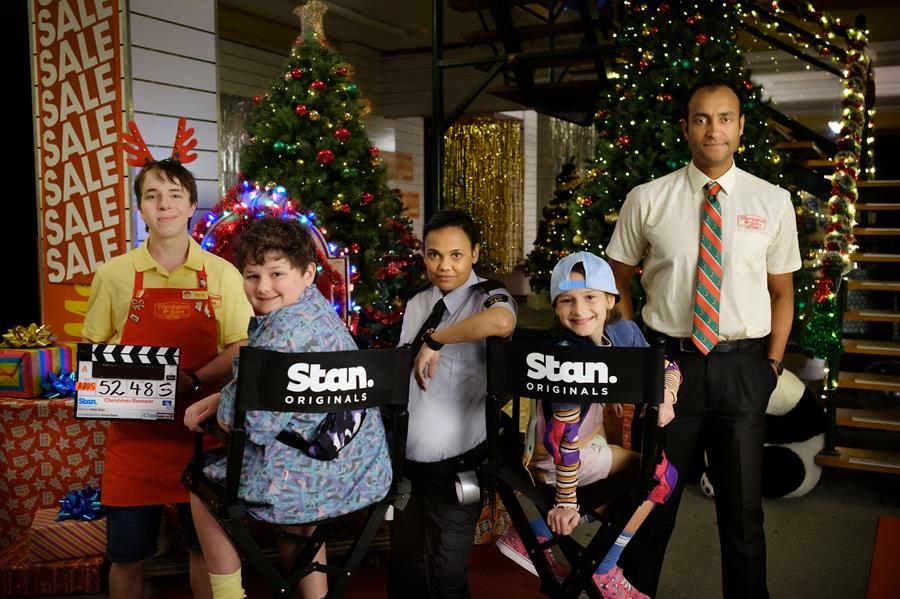
A riotous Christmas romp for the whole family, Christmas Ransom is a Stan Original Film from the creators of A Sunburnt Christmas, starring an ensemble of beloved Aussie stars.
8 September 2022 – Stan, Australia’s unrivalled home of original productions, today announced filming has commenced in Homebush, NSW on the brand new Stan Original Film Christmas Ransom, starring acclaimed comedian Matt Okine (Stan Original Series The Other Guy), TV Week Logie Award-winner Miranda Tapsell (Top End Wedding, The Sapphires, Love Child) and Ed Oxenbould (Stan Original Series Bloom, Puberty Blues, Paper Planes), with the film set to premiere this festive season, only on Stan.
Written by Elliot Vella, Gretel Vella and Timothy Walker (A Sunburnt Christmas) and produced by Every Cloud Productions (a Global City Group company), the creators of the award-winning Stan Original Film A Sunburnt Christmas and the Stan Original Series Eden, Christmas Ransom is a riotous comedy-adventure inspired by family favourites such as Home Alone, Die Hard and Elf, packed with heart and hijinks.
When beloved toy store, Harrington and Sons, is hijacked on Christmas Eve by a pair of bumbling criminals and the struggling owner (Okine) held for ransom, a pair of shoplifting kids stumble into the heist, where they are forced to team up with a heavily pregnant security officer (Tapsell) to save Christmas for everyone!
Christmas Ransom will also star Genevieve Lemon (Stan Original Series The Tourist, Prisoner, The Power of the Dog), Bridie McKim (Stan Original Series Bump, Dive Club) and young stars Evan Stanhope (Thor: Love & Thunder), Tahlia Sturzaker (I Am Mother, Ascendant) and Chai Hansen (The Newsreader) round out the cast.
Stan Chief Content Officer Cailah Scobie said: “Our Stan Original Christmas films have quickly become a beloved staple of our annual lineup, following the success of A Sunburnt Christmas and Christmas on the Farm. We are elated to again be working with the talented team at Every Cloud Productions, the brilliant writing team of Elliot Vella, Gretel Vella and Timothy Walker and such a fantastic cast to bring a fun and heartfelt tale to our screens this holiday season.”
Drew Grove, CEO and Executive Producer at Every Cloud Productions, said: “Christmas Ransom will bring the same irreverent humour and warmth everyone loved in A Sunburnt Christmas, with the added fun of some wild, high-stakes action hijinks. With a lot of mischief and heart, it will give everyone the chance to laugh, cry and cheer together for a film that is sure to become one of Australia’s classic Christmas tales.”
The Stan Original Film Christmas Ransom is created and executive produced by Drew Grove, Fiona Eagger, Deb Cox, and Mike Jones (all: A Sunburnt Christmas), directed by Adele Vuko (Skitbox, Wham Bam Thank You Ma’am, writer: Love Me), and produced by Naomi Just (The Unusual Suspects, Born to Spy, Ronny Chieng: International Student).
Christmas Ransom is financed by Stan in conjunction with Screen NSW under the Made in NSW Fund, Fulcrum Media Finance and Every Cloud Productions.
You may or may not remember A Sunburnt Christmas – we’re going to go with “not” – which was an odd mix of holiday cheer and a five year-old running around with a loaded shotgun.
Plus there was a lot of stuff about the death of a loved one, which tended to bring down the mood in a movie supposedly featuring plenty of “irreverent humour and warmth”. But it did feature an armed robber dressed as Santa, so it wasn’t all bad news.
Anyway, this looks like more of the same slightly-misjudged slapstick for the third year* in a row. Fingers crossed this is the year we get a Christmas miracle and the end result is actually funny.
.
*okay, last year’s Christmas on the Farm was more of a rom-com – the slapstick was provided by viewers rushing to turn it off
Wars and Rumours of Wars
What to think about this?
EXCLUSIVE:
TV Tonight hears whispers that Seven has a new sketch comedy in the pipeline for 2023.
Helium, recently founded by Mark Fennessy, is understood to be producing the new series, which has been running a Writers’ Room in recent weeks. It has recently produced 6 Festivals and Last King of the Cross for Paramount+ with drama series Paper Dolls announced for 10.
Seven had a hugely successful run with Fast Forward from 1989 – 1992 followed by Full Frontal from 1993 – 1997. More recently series have included Housos: The Thong Warrior, Australia’s Sexiest Tradie, Orange is the New Brown and Kinne.
Seven is also due to announce details of its upcoming Kath & Kim revival, believed to be a 20th anniversary special.
The big problem with this is that it assumes there’s an audience for generic sketch comedy. And there may well be – it just hasn’t been turning up for any of the many generic sketch comedy shows we’ve had this century.
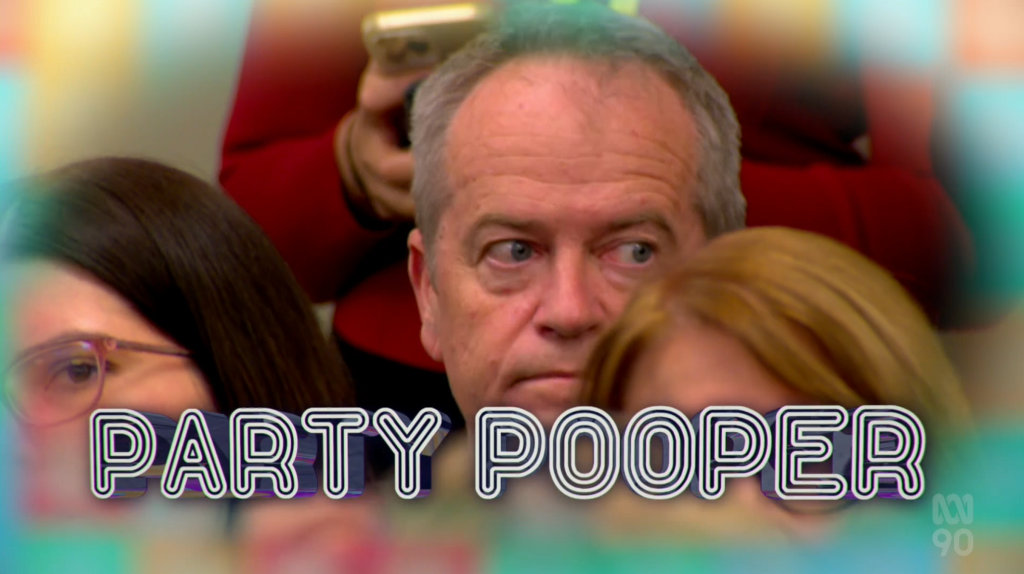
As a fun exercise, what was the last sketch show that was a hit simply because it was a sketch show? We’re not talking something like Mad as Hell or The Weekly, which may contain “sketches” (definitely in Mad as Hell‘s case, kind of in The Weekly‘s) but is based on news and current affairs and features an already well-known host. We mean shows like The Big Bite, Wednesday Night Fever, Double Take, The Elegant Gentleman’s Guide to Knife Fighting, and so on. You know, all the big hits.
(time passes)
(the ghost of Kinne can be heard in the distance)
The handful of sketch shows that have worked in this country since the glory days of Fast Forward and The Comedy Company have pretty much all been put together by a team with a solid history of working well together. Not a “writer’s room”.
You know what you get from a “writer’s room”? Open Slather. That’s not a good thing.
“But what about Saturday Night Live,” we hear some random chump yell out. “They have a writers room and they’ve been going for a billion years”. First: have you watched Saturday Night Live lately? It’s barely a comedy on a good day. Second, they have (by local standards) a massive writers room full of the top sketch writers in a country ten times the size of Australia, and most of their sketches still suck.
Sketch comedy works when it’s a bunch of talented mates working together. It doesn’t need to be a lot of mates: Mr Show is a classic, and that was based around two people. But you need the energy and sense of fun that comes from people who know (and usually like) each other working together to create something funny. If you don’t have that, all you have is the last thirty years of Australian sketch comedy.
But who are we kidding? Being funny isn’t going to be the aim here: it’s all about tapping into nostalgia. It may not feature a bunch of “familiar faces”, but it’ll be pitched as a return to the good old days anyway simply because in 2022 “sketch comedy” is the same as “variety” – a format people keep saying they want back but have no real desire to actually watch.
What people want is funny television. Restaurant sketches need not apply.
Oh We’ve Got a Question All Right
Press release time!
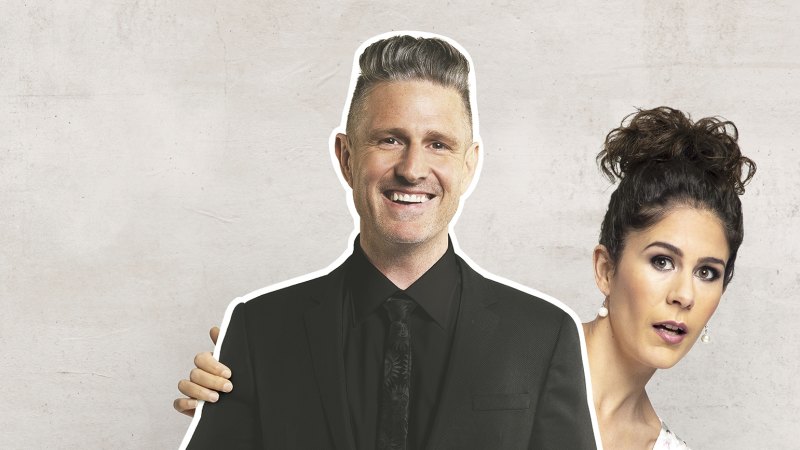
SO AMAZING!: ABC SHOW’S SHOCK ANNOUNCEMENT
An ABC Show has an announcement, that announcement is a shock and someone thinks it’s amazing news. How enticing! No wonder you clicked. But now you’re a paragraph in and still haven’t received any detail. That’s just how news works now. How annoying, hey?
If you don’t click away and carry on reading, you’ll discover the show is Question Everything, remember that show starring Wil Anderson, Jan Fran, and a panel of Australia’s best and brightest comedians? Well, they have a shocking announcement. Unfortunately, news websites need you to scroll down the page to pass more ads so they won’t reveal the announcement for another paragraph.
By now, you’ve probably been distracted by one of those auto playing videos that isn’t even about this story. So annoying! Can we just get to the shocking new announcement? It’s not that Question Everything stars a panel of Australia’s funniest comedians battling misinformation in the news media. We already knew that, after all. The shock announcement is that Question Everything is returning for a massive 10-episode second season on ABC TV and ABC iview on Wednesday 28 September, 8.30pm.
Now, you might think you have all the vital information you need, yet the article is carrying on. There’s probably a slideshow of photos stolen from Instagram but all you’re really interested in is finding out who said that “So Amazing” quote from the headline. Host Wil Anderson said of the return: “Finally, some news you can trust. It’s true, Question Everything is coming back with a panel of your favourite comedians and the best new up-and-comers. Together, we’ll see who has the facts straight and who has their news limited.”
While Co-Host Jan-Fran added: “When I first heard Question Everything was coming back I checked the source of the information, then double-checked it, and verified it with an independent third party. Only then did I believe it. I cannot wait for another season. It is always a thrill to tell Wil he’s wrong and on this show I get to do that a lot.”
But neither of them used the exact phrase ‘So Amazing’. Turns out, it was from some tweet that wasn’t even really related to this story. Gosh, what has happened to the news?
Question Everything will air Wednesday 28th September at 8.30pm on ABC TV and ABC iview.
And now we feel the need to apologise for running that in full. Or as the press release put it:
How annoying, hey?
Ten more episodes of this half-baked attempt to create the long-dreaded Gruen News? Is it a quiz show? A panel show? A show where the host apologised for the poor quality of his panelists?
Wow, if you stick a question mark on the end of obvious observations they really don’t become any more entertaining, do they?
Like No Other Love
The important thing to say about Summer Love is that it’s very good for what it is. It’s just that what it is, going by the first episode at least, isn’t all that funny. Which is intentional! And also a bit disappointing.
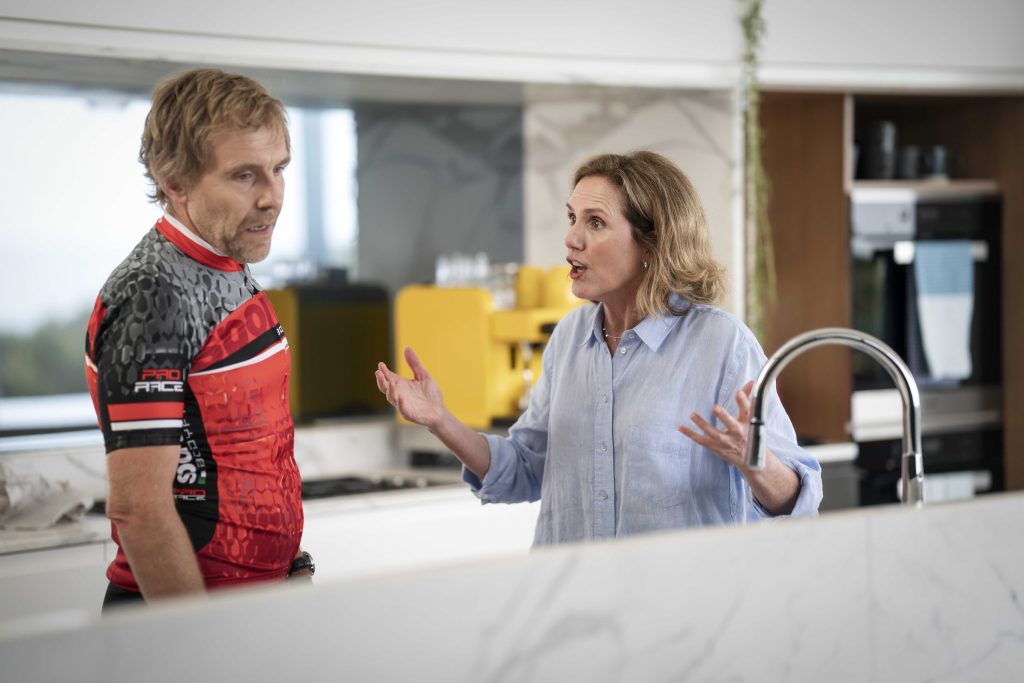
Summer Love is an anthology series based around a beach holiday rental. Each week a new couple or group of people turn up to work through some kind of issue that might sound like it has comedy potential but again, isn’t all that funny in practice.
The first week sees two couples turn up for their yearly break together, only right from the start there’s conflict a-brewing. One couple now has a two year-old, who is boring and annoying to everyone but her parents. The other couple rapidly has a bunch of grievances (“why didn’t we get the good bedroom?”), which stretch the group’s already tenuous bond. It turns out the new mother is also a new-ish member of what is an otherwise long-term friendship, while the blokes increasingly inhabit different (and in one case, not-so-blokey) worlds.
To stress, none of this is completely unfunny (there’s even a good riff about the crappiness of “classic rock” radio), but it’s more about sharp observations and slowly widening fault lines than firing out the jokes. Which is fine – it’s a one-off half hour story, surely it’s building to a big comedy pay off, right?
Nope. There is a big payoff, but it’s pretty much all dramatic. Turns out this has been something closer to a nicely crafted half hour play than anything else. It’s a quality Australian drama that’s fine for what it is but – and again, and we can’t stress this enough because it’s airing in a traditional ABC comedy timeslot – it’s not all that funny.
We’ve gone on a lot here over the years about how “comedy” now basically means “everything that’s not serious drama”. This is an example of that. Maybe future episodes will be funnier; there’s one co-written by Nath Valvo that looks promising. Wayne Hope & Robyn Butler (AKA Gristmill, who have produced this series) also have an episode that looks like they’ll be in fine form.
But going by the summaries, most of the episodes seem to involve couples dealing with personal issues in a way that suggests this series has started how it means to go on. A quick check on IMDB reveals that a lot of the episodes were also written by cast members (including the first one). It feels like it; the characters are well crafted and believable, their interactions are interesting, the dialogue is plausible, and if you don’t care about them there’s nothing else here to keep you watching.
(ok, the beach house is nice)
Still, if this was The Australian DramaWeeds we’d be giving this a big thumbs up. It’s a solid half hour of television and if Australia has to make dramas about middle class people’s personal problems then keeping it to half an hour is definitely the way to go. But for comedy fans, it’s not exactly a big win.
The ABC is firmly committed to a steady stream of half hour scripted programs that are presented as comedies – because audiences actually like watching comedies – but where “being funny” barely gets a look in. For every Fisk there’s five seasons of Rosehaven, two seasons of Aftertaste and now this.
And just because this is a better drama than both of those doesn’t make it a comedy.
Sitcoms Are Back Baby!
Press release time!
Aunty Donna serves up their first narrative comedy series for ABC
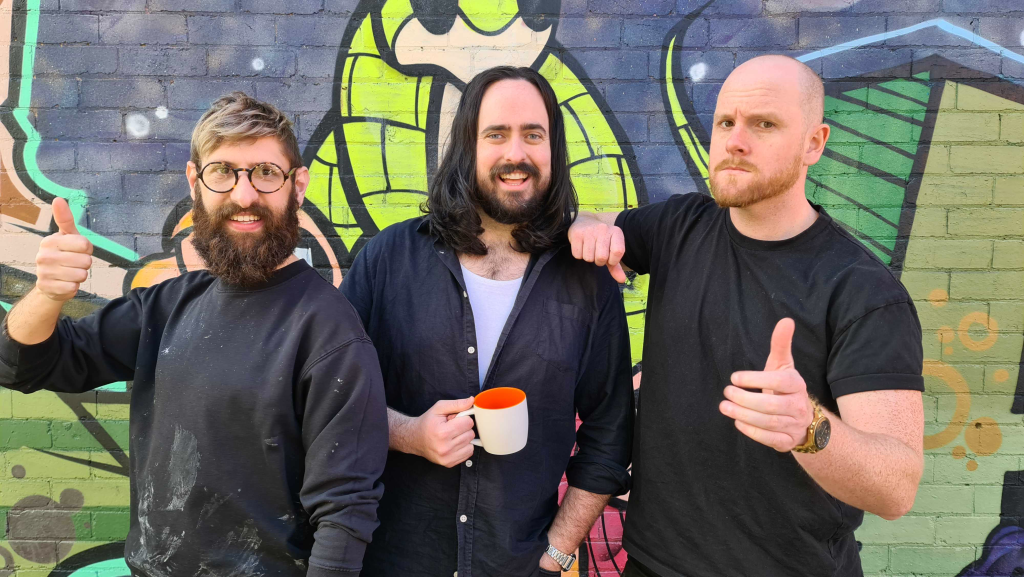
The ABC and Screen Australia are thrilled to announce that Australia’s rock stars of comedy, Aunty Donna, are making their first foray into narrative comedy with the brand-new half hour series Aunty Donna’s Untitled Project.
Filming from next week in Melbourne and starring Aunty Donna’s Mark Samual Bonanno, Broden Kelly, and Zachary Ruane, the high octane and unpredictable series follows the story of three best mates running a trendy cafe down one of Melbourne’s less-than-iconic laneways.
Aunty Donna says: “We make show, you will love.”
Todd Abbott, ABC Head of Comedy, says: “ABC audiences first got a taste of Aunty Donna in 2014 in Fresh Blood, so we couldn’t be more excited to have them back where they belong and to be the home of their first narrative comedy series. Strap yourselves in… this is going to be a wild ride.”
Screen Australia’s Head of Online Lee Naimo said, “We’ve been proud to support Aunty Donna throughout their career as they’ve gone from strength to strength creating original content and building a cult audience online, from their Fresh Blood series to 1999 through Skip Ahead and Glennridge Secondary College on YouTube. So naturally we’re delighted to support their first foray into a sitcom format bringing along their trademark absurdity. We’re confident this series will be a hit with devoted fans and newcomer audiences alike.”
VicScreen’s CEO, Caroline Pitcher, says: “We’re delighted to support the debut sitcom from the iconic comedy trio, Aunty Donna. Bringing together two Melbourne greats – laneway cafes and the absurd comedy of Aunty Donna – audiences are set to be thoroughly entertained when it hits our screens next year.”
Aunty Donna’s Untitled Project will air on ABC TV and ABC iview in 2023.
Guess all that cash freed up by the end of Mad as Hell has- wait, we’re just getting an update… seems Mad as Hell was technically “live entertainment” while this is “scripted comedy” so budget-wise they’re not really connected. Which makes sense when you think about how long it must have taken to set this new show up.
Also, it’s about bloody time. This is such good news we’re even going to skip the part where the Screen Australia chief tactfully avoids mentioning their most recent series for Netflix. “Debut sitcom?” Really?
It’s been an insult to Australian audiences that Aunty Donna hasn’t been an ABC mainstay for years, and it’s cause for celebration that this insult has finally been rectified.
Hopefully they don’t end up calling it Three Men and a Babyccino.
Vale Aftertaste series 2
As we farewell Aftertaste series 2 it’s worth asking: Who was this for?
It’s not for people who expect a sitcom to be funny, that’s for sure. At least not in the multiple-gags-a-minute style of, say, Fawlty Towers, Frasier, or All Aussie Adventures. In Aftertaste, the occasional funny moment is about the most you can expect.
Warwick Thornton was usually the source of these occasional funny moments. He brought an innocent gormlessness to the character of Brett that was both funny and a welcome contrast from the other characters, who largely spent the series arguing with and insulting each other. And while families who argue with and insult each other can be very funny (Fawlty Towers, Frasier), it quickly gets annoying to watch unless they’re arguing in a funny way.
So often in Aftertaste, someone on the production team assumed that a young person-sounding insult directed at an older person (“cock womble”, “douche biscuit”) would be hilarious. It wasn’t, it was grating, and sounded like something a middle-aged person thinks a young person might say.
The other mistake the makers of Aftertaste frequently made was to assume that high-energy performances and pratfalls could make up for any gag deficits in the script. And again, no. The sequence in the series finale, in which Easton (Erik Thomson) got annoyed with how Diana (Natalie Abbott) was doing a U-turn, was a classic example. Exasperated shouting at people is only funny if the things people are shouting are funny.
Still, who needs laughs when there’s food and scenery? This is a show about two chefs who live in the lovely Adelaide Hills town of Uraidla after all. Well, the plot in which Diana and Easton were forced to work together and ended up creating a bunch of new dishes based on ingredients they found in a bin was interesting, but if you tuned in for the food, that was kinda it.
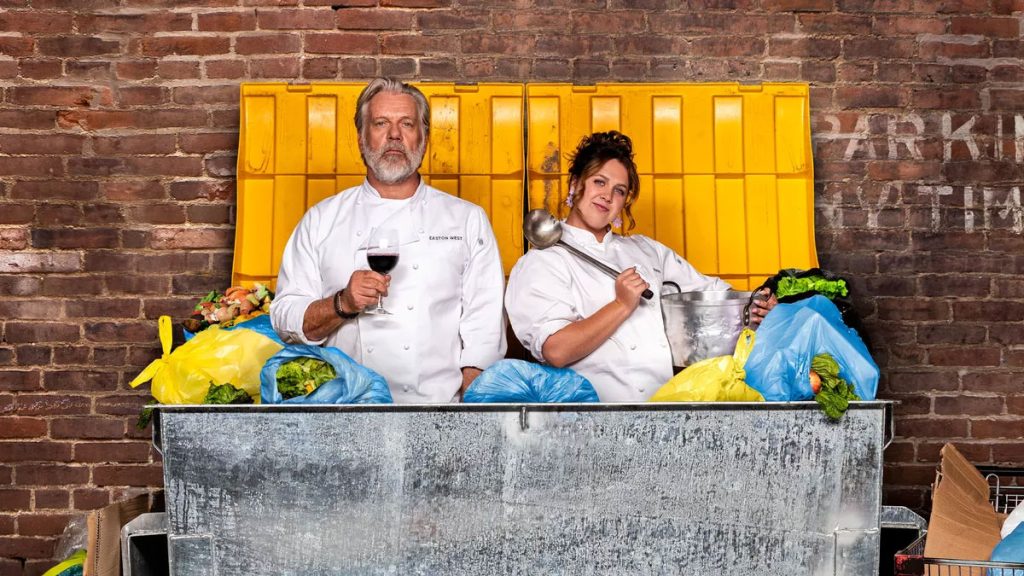
There were also a few swipes at TV cookery and reality shows (i.e., War on Waste), with the success of Diana and Easton’s work with the homeless charity leading to the pair being offered a series. However, given that much of the footage shot by filmmaker Frog (Nic Krieg) consists of behind-the-scenes arguments between Diana and Easton, this won’t be much of a cooking show.
This brings us to drama. Maybe Aftertaste is a show for people who like drama? And again, not really. The romance sub-plot between Easton and winemaker Margot (Rachel Griffiths) didn’t really go anywhere, nor did whatever’s happening between Diana and her mates Nayani (Kavitha Anandasivam) and Kwame (Justin Amankwah).
As for the main thrust of the plot, its problem is it’s incredibly predictable. The first series featured a character who looked like he’d die any second and duly did in the fifth episode. The first series also featured frequent mentions of a character (Grandma June) who’d mysteriously left decades ago and was clearly going to return at some point. She duly did in series 2.
Now we’ve reached the end of series 2 and it’s time to lay the groundwork for series 3*, hence Frog shooting Diana and Easton’s show like it’s Keeping up with the Kardashians. This will presumably result in some kind of scandal involving the characters and another family bust-up in series 3.
So, who was Aftertaste for? It’s trying to be a lot of things to a lot of people – people who like comedy, people who like drama, people who like romance, people who like cooking and nice scenery – and it’s not really succeeding at any of them. To use a cooking metaphor, there are too many ingredients when a few simple, well-chosen ones would make a tastier dish. Maybe with a bit more focus, and a greater commitment to quality, Aftertaste would be a Michelin Star show rather than the mismatched mix of leftovers that it currently is.
* The third series of Aftertaste has yet to be announced.
Mad as Mad as Hell
Is it just us, or is Mad as Hell going just a little bit harder in its final season?
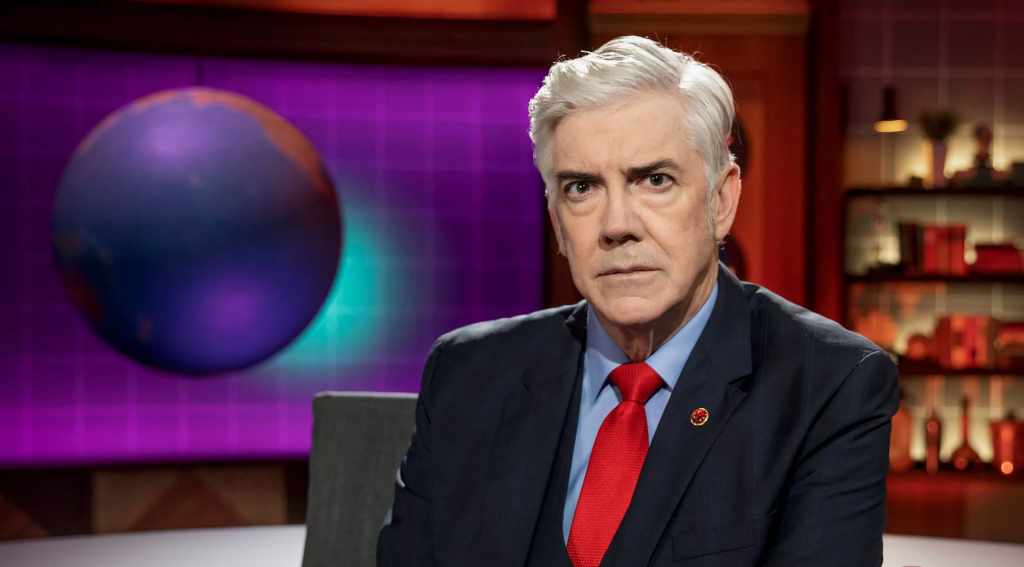
We’re not exactly talking “the gloves are off” here. But there’s definitely a sense that, with not a lot left to lose, they might as well go right ahead and point out the many and varied hypocrisies underlying Australian politics today. Hurrah!
The glee with which host Shaun Micallef built up to this week’s story about the reveal that Scott Morrison was something of a one-man band as far as government ministries were concerned wasn’t surprising in itself. What was surprising – and entertaining – was just how over-the-top it was.
Morrison was crap, but him being the PM put some restrictions on coming out and saying “he’s crap”. That meant that Mad as Hell had to dance around the topic somewhat (see the increasingly pointed pause between “the Prime Minister” and “Scott Morrison”); now that he’s out of office, all bets are off.
And with a fresh government has come a sharper focus. Whereas in previous seasons some of the interviews have been wide-ranging rambles on current events, now more often than not the desk-based chats have a clear point to them. The Clarke & Dawe influence is currently shining through, and that’s never a bad thing.
It’s not just the overtly political interviews either. Financial advisors always give the same advice (“stick with it”) no matter how poorly performing the stocks? It might be a one-joke sketch, but it’s a good joke, the sketch is sharply told, and there’s even a punchline that doesn’t involve giving away a t-shirt.
Four weeks into Mad as Hell under an Albanese government and the difference boils down to this: Labor might have a range of problems and issues to make fun of – last week’s interview with not-Penny Wong made the very good point that Labor is better at international diplomacy because their internal power struggles push the best liars to the top – but at least they’re displaying a basic level of competence. The Morrison government? Not so much.
Blundering fools, self-serving scam artists and outright monsters are fun to mock, sure. But getting Mad as Hell to make fun of the Morrison government often felt like bringing a shotgun to a thumb-wrestling contest. Micallef and crew are a finely tuned comedy machine: Morrison and his cartoon cronies provided them with a lot to work with, but only in the same way as a elephant keeps the clean-up crew at the circus busy.
It’s a real shame this is Mad as Hell‘s final season for a whole range of reasons. Having the show deliver some of its best political comedy work on the way out the door isn’t exactly helping.
Dead On Arrival
Press release time!
New SBS Digital Originals series A Beginner’s Guide to Grief is a baptism by fire that proves laughter is the best medicine
The dark comedy premieres Sunday 4 September on SBS VICELAND and SBS On Demand
Once a hot mess – now just a mess – Harriet ‘Harry’ Wylde (played by writer and creator Anna Lindner) is about to learn that grief doesn’t play by the rules. Soon, neither will she. Join Harry as she navigates the loss of her two terminally ill parents in the one week, and the unpredictable fun park of grief that follows in the Digital Originals short form dark comedy, A Beginner’s Guide to Grief. Based on Lindner’s personal story, the series looks beyond the flowers and hallmark cards, and dares to lean into the terrifying messy but transformative experience that is grief. The series will premiere on Sunday 4 September on SBS Viceland and SBS On Demand.
Alongside Lindner, title roles are also played by Cassandra Sorrell as Daisy ‘Fireball’ Jin (Bump, Eden), Georgina Naidu (Seachange, Fisk) as Aunty Barb, Rory Walker (The Hunting, Escape from Pretoria, Hotel Mumbai) as Uncle Trev, Carlo Ritchie (of comedy duo The Bear Pack, Prank You Very Much, Celebrity Letters & Numbers) as Isaiah Wylde, with Caitlin McDougall (The Alice, Always Greener, A Country Practice) as Diane Wylde, Glynn Nicholas (The Big Gig, The Glynn Nicholas Show) as Reggie Wylde, and Brett Goldstein (Ted Lasso) as the voice of the grief expert on a series of cassette tapes. Joining them is Yazeed Daher (The Hunting, Safe Harbour) as J.W. Nathaniel, Danny Ball as Seth, Lori Bell as Senior Constable Peta, Zoe Min O’Callaghan as Young Daisy, Daisy Kennett as Young Harry, and Leela Varghese as Kamille.
It is directed by Renée Mao (The Last Line, The Sound of Drowning), whose work is rooted in powerful, narrative-driven storytelling, and often tackles intimate, sensitive subject matter. The producing team from KOJO Studios is executive producer/creative producer Linda Ujuk and producer Kate Butler, together with producer Julie Byrne.
Harry (Lindner) never imagined things panning out the way they have. Having to forgo her dream New York arts scholarship, being the only child, she had no choice but to return to her tiny hometown back in regional South Australia following the news of her father’s (Nicholas) terminal cancer diagnosis. Later, her mother (McDougall) soon receiving the same fate.
Losing both parents in the space of a week isn’t helped in the least by her devout Lutheran Revivalist father announcing moments before his death that they never believed in God and leaving Harry to handle one puzzling last request – to be cremated. This is made even more complicated when surrounded by a strict Christian community who are dead set on giving Harry’s parents a full blown, Holy Spirit-certified burial. Fortunately, her mother left her the worst gift ever: an old Walkman and some vintage cassette tapes about grief, offering little comfort other than an excuse to block out the world.
With an entire village all up in her business, Harry has no time to acknowledge her grief. First, there’s the chance encounter with her dysfunctional childhood foster-sister, Daisy; a pyromaniac who is fresh out of prison, then there’s her overbearing Aunt Barb, her socially awkward and outright peculiar cousin Isaiah, her Uncle Trev with the full force of God on his side, and an entire Christian community firmly against cremation of the dead. While the rest of the town follow God’s will, Harry is hell-bent to follow her own… even if that means giving the entire community a transcendental high so intense, only heaven could compare.
SBS Commissioning Editor, Scripted, Loani Arman said: “A Beginner’s Guide to Grief not only explores the uncomfortable and confronting nature of grief, but also how surprising and transformative the experience can be. We’re proud to continue the success of our Digital Originals initiative with this story and offer even more pathways to underrepresented creatives.”
Executive Producer at KOJO Studios, Linda Ujuk said: “I’m extremely proud of our first original and the cracking female-led key creative team memorialising a deeply personal story of grief with all its messy absurdity and beauty. I’m thrilled an audience finally gets to experience the dark comedic brilliance of Anna Lindner, a powerful new voice whose sharp honesty and humour will loudly resonate with anyone who’s experienced the loss of a loved one.”
Writer and Creator of A Beginner’s Guide to Grief, Anna Lindner: “This is about giving a voice to an experience that is totally unique to me, yet simultaneously universal. An experience that is undeniably precious, sacred, and can be positively life-changing, but only if we allow ourselves the time, compassion, and permission to be present with it. I want people to know that grief and joy don’t just co-exist, but they belong together.”
Screen Australia’s Head of Online, Lee Naimo said: “We are proud to have supported this compelling and authentic story through our Digital Originals initiative, and I’m thrilled to see it reach audiences next month.”
South Australian Film Corporation CEO, Kate Croser said: “The SAFC is proud to have supported this exciting new series from South Australia’s KOJO Studios and written and created by emerging regional South Australian writer Anna Lindner, establishing her as a new South Australian ‘Greenlighter’ talent with a bright future ahead of her.”
A Beginner’s Guide to Grief is a KOJO Studios production in association with SBS. Principal development and production funding from Screen Australia, financed in association with South Australian Film Corporation, and supported by the Australian Government through the COVID-19 Temporary Interruption Fund.
Not having seen this series, it would be wrong for us to make any comment about its quality or lack thereof. It’s probably really good. But will it be really funny?
We’re going to go with “no”.
Here’s a question: if you’re making a comedy, do you hire as a director someone “whose work is rooted in powerful, narrative-driven storytelling, and often tackles intimate, sensitive subject matter”, or someone who “makes people laugh”? Answers on the back of a blah blah blah.
What this seems to promise is a whole lot of stuff about dealing with death, and that some of that stuff will, if seen from a certain angle, seem amusing. Sure, grief and joy might belong together, but let’s be real here: grief usually takes the lead in the week after both your parents die.
It’s no mystery why this kind of series gets labelled a comedy (or even a “dark comedy”). While creatives desperately want to explore their own personal experiences, audiences for the most part want to be entertained. Comedy? Entertaining. Watching someone bury their parents? Might be a bit of a chore.
We’ve said it before, but here it is again: in the wake of the rise of dramedy – and audiences realising that “dramedy” usually means “shit drama” so the term “dramedy” has been quietly shelved – the definition of comedy has expanded to a point where it’s now all but meaningless.
Today drama is a very narrowly defined genre that is 100% serious all the time in every direction; everything else now, no matter how much or little comedy it contains, is a comedy.
Just don’t expect to laugh much at it.
These Winners Ain’t Grinners
Win the Week is back – okay, it was back last week, but we figured we’d give it a little more time to become a little less shit. Time well spent? Yeah, nah.
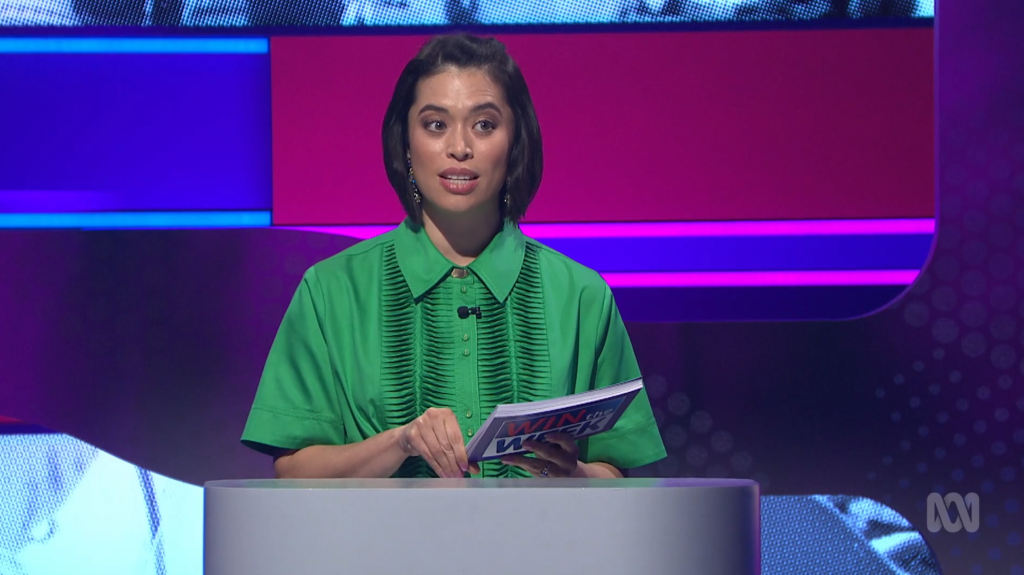
Hosted by Alex Lee and with The Chaser‘s Craig Reucassel as a series regular, this is a show where three contestants “go head to head in a battle of news knowledge”. Only for some reason the show starts with a quiz-off to find out who gets first pick of the celebrities who they’ll be partnering with, which in a half hour show feels a little indulgent until you realise that, like every single other ABC panel show in living memory, it’s all about the celebrities.
Let’s put it this way: it takes three and a half minutes – over 10% of the episode – to get the show to the point where it can actually begin to be a quiz show. They’re still doing a quiz, only the prize is that at the end you get to start the “real” quiz. Gripping viewing!
After two weeks it’s clear that, beyond the now extra pointless opening, the “exciting changes to the format” we were promised are pretty much limited to now being able to betray your quiz partner at any time, AKA the most minor and meaningless change possible. Because everything else here was working so well the first time?
To be fair, this year’s Win the Week has addressed a few of the problems of last year’s model. The show moves a little faster, the focus is more on the quiz (early on) or on celebrity banter (later on), and getting rid of the regular betray slot removes one of the show’s major speed bumps. But it’s still basically the same show, which…
Look, it takes a lot for us to feel nostalgic for Hard Quiz, mostly because there’s only a few weeks each year without a new episode of Hard Quiz. But at least that’s a quiz show that’s just a quiz show: we’re still not quite sure what the hell Win the Week is trying to be.
Haha only joking: like we said earlier, it’s a celebrity showcase. The whole “you can ditch your celebrity partner” angle – which adds almost nothing to the show for the home viewer; the celebrity is still on screen, just in a slightly different position – is designed to keep the spotlight on the celebrity at all times. And what do they do with that spotlight?
Not a whole lot, because it’s still technically a serious quiz show, so they’re either seriously answering a question or making apologies for not being able to seriously answer a question. There are some jokes – after a reference to Earth having it’s shortest day ever, Reucassel said “ahh, so that’s why I didn’t get anything done” – but HYBPA? and The Cheap Seats have already done two hours of news gear by Wednesday, you’ve got to do better than that to get a laugh.
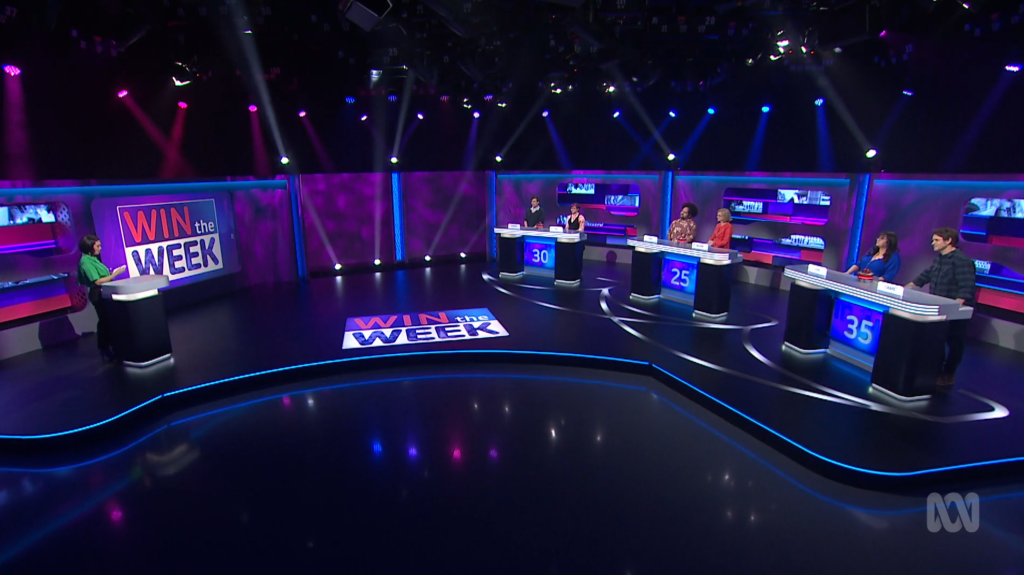
Of course someone hits the betray button ten minutes in, because if they don’t what’s the point? And maybe we missed something, but now if you decide to betray your partner you can just pick a better one and the person with the better one is shit out of luck? How is that fair*? Fingers crossed there’s an upcoming episode where everyone is desperately trying to get the one super-smart celebrity and there’s fifteen betrayals in twenty minutes.
The games are your standard news quiz stuff while the banter between the celebrities – and only the celebrities are allowed to banter really – is fine, but not something you’d pay for. And in an attention economy, every second you spend watching this is a second you’re not maximising the value of by watching something better. Any episodes of The Einstein Factor up on YouTube?
The real question behind all this is, why is this prime time viewing? This is the kind of show that should be on at 6pm every weeknight to an audience of comatose pensioners sleeping off their dinners. It’s literally just a collection of facts from the week’s news phrased as questions, delivered to the kind of celebrities often found hanging around the ABC canteen.
There’s nothing going on here that makes it worth an 8pm timeslot on what used to be the national broadcaster’s strongest night of programming. Win the Week? As far as ratings goes, looks like the ABC have already given up.
.
*in the earlier version, you had to be coming last to betray your quiz partner; we’re not sure if that’s still the case, or if there’s now any kind of limit on how many times you can betray the person next to you (the old version had specific moments for betrayal, so there were set limits)
Slightly Obscure Musical Reference Time
Spicks and Specks is back! Again. For what, the fifth time now? At least we’re getting a full season (10 episodes), so there’ll be plenty of time to remember just how forgettable the whole thing is.
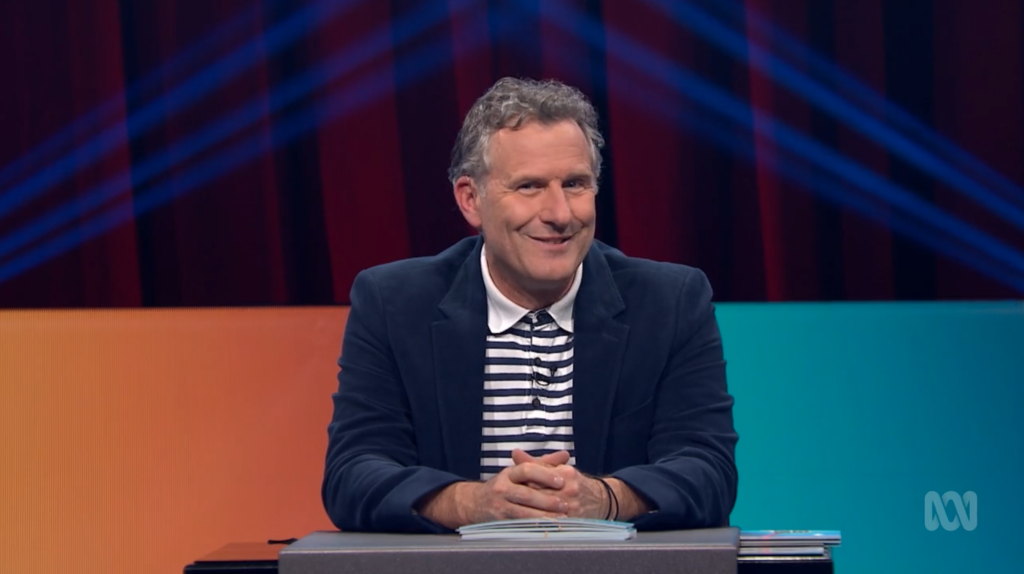
When Spicks and Specks made its debut back in 2005, music was a very different thing. For one, the past still existed and music had a future; now there’s just a whole bunch of noise on various streaming services, and whatever you’re into could be coming at you from any direction.
Which you might think would be a problem for a show like Spicks and Specks, where much of the point is either straight-up nostalgia or the energy you (hopefully) generate from smashing two usually separate time periods together. A modern performer doing a song with The Wiggles? Getouddahere!
Fortunately, with the show now seventeen years old and with a pair of team captains in Alan Brough and Myf Warhurst who are now on board not because they’re experts on music but because they’re Alan Brough and Myf Warhurst, the deal here more often than not is just nostalgia for the good old days of Spicks and Specks.
Put in more musical terms, this is yet another comeback tour doing the greatest hits. The most modern piece of technology shown in the opening credits is an original iPod; otherwise it’s cathode ray TV sets and vinyl records all the way. One of the first questions was a reference to a Disney movie from 1967!
The guests might have current hits – or at least, current work – but the chances of anyone watching at home buying a ticket to their next pub or club performance is slim at best. When Bec Charlwood explained her answer with “people under 30 would know”, that ruled out the entire at-home audience.
Still, not every show on the ABC has to be relevant to the under-50s – though it’d be nice if Spicks and Specks had a run time that was under 50 minutes, because the current version feels bloated, self-indulgent, and more than a little aimless no matter how often they accidentally show the wrong music clip or have Dave O’Neill hold up balloon animal versions of the cast.
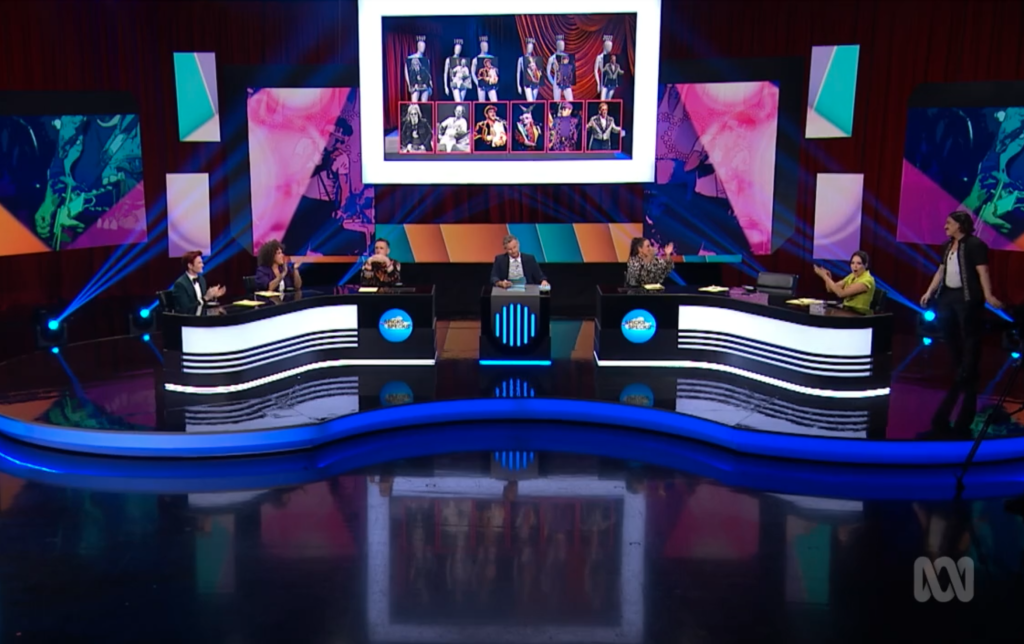
Yes, this is only barely a quiz show and by having musicians on you’re all but guaranteed to get some decent anecdotes throughout the episode. The musical numbers break things up too, and host Adam Hills remains a rock-solid pair of hands who can be relied to keep the moderately competent laughs coming like a freshly upgraded Wil Anderson.
And while Warhurst and Brough have mellowed over the years – gone for the most part are the days when Brough’s drive to succeed brought a palatable chill to proceedings – that fits the more cruisey, chuckles-over-laughs, nostalgia-driven vibe.
But there’s a reason why 20 minute prog rock epics were shouldered aside by 2 1/2 minute punk rock tracks.
